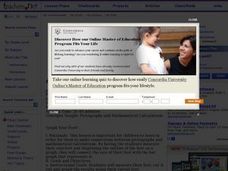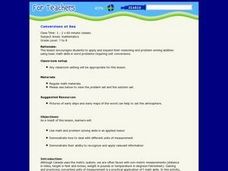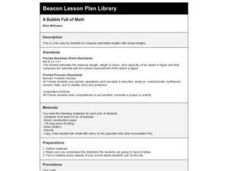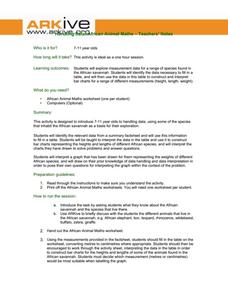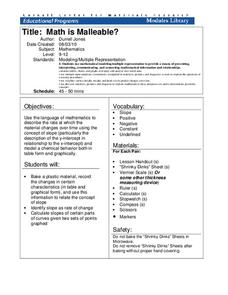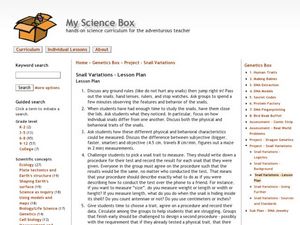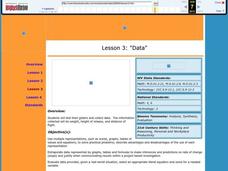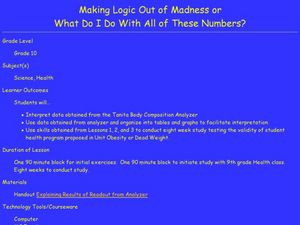Curated OER
Graph Your Foot!
Learners measure their own foot and place the outline on a graph. They make connections between the size of their foot and the bar graph that represents it.
Curated OER
Conversions at Sea
Learners demonstrate problem solving skills. Students complete word problems requiring unit conversions. They convert both metric and standard units. Learners must determine necessary information to solve problems.
Curated OER
Learning the Letters
Students identify the letters of the alphabet. In this letters instructional activity, students use an iPad to play games, draw pictures, and listen to videos about the alphabet. They use pipe cleaners to create their name.
ARKive
Handling Data: African Animal Maths
Handling and processing data is a big part of what real scientists do. Provide a way for your learners to explore graphs and data related to the animals that live on the African savannah. They begin their analysis by discussing what they...
Curated OER
When Dinosaurs Ruled the World
Students graph the varying sizes of dinosaurs. In this math and dinosaur lesson, students view dinosaur models and compare the different shapes and sizes of the dinosaurs. Students complete a dinosaur math activity, read The...
Curated OER
I Can Grow and Change
Students explore activities done at various stages of life. In this personal growth lesson, students are read All By Myself by Mercer Mayer and participate in a discussion about how they are growing daily, discuss what activities...
Curated OER
Bungee M&M's
Science is exciting - and delicious! Pairs of learners set up a bungee cord type of experiment. They use buckets filled with M & M's, a meter stick, and a Slinky spring (as the bungee) to conduct their experiment. A good activity...
Education World
Predicting Pumpkins
If you want more pumpkin seeds, you should get a bigger pumpkin—right? Young harvesters use estimation skills to make a hypothesis about how many seeds they will find in a pumpkin before examining the real number inside.
PBS
Arguing over Area
With the help of the Area Officers and Perimeter Patrol, you learners will develop a better understanding of area and its relationship to perimeter. First, they view a video clip from Cyberchase, and then they visit a website to...
CPO Science
Potential and Kinetic Energy
Here's a resource ideal for independent learners who need extra reinforcement or would like to work ahead. These textbook chapters and practice problems cover many basic physics concepts, starting with potential and kinetic energy and...
Curated OER
Going to the Doctor: Social Story
A trip to the doctor can be a difficult experience for some pupils. Intended for use with Autistic children, this social story prepares them for a visit to the doctor. Each page contains an image and a different facet of what happens at...
Perkins School for the Blind
A Visit to the Doctor
Going to the doctor's office may be a source of stress and uncertainty for some children. Help your learners with special needs discover what to expect at and how to cope with their next trip to the doctor. They explore real medical...
Curated OER
Miss America
The first part of this article by PBS on the Miss America pageants can be used in a health class when it's time to talk about body image. There are links to related articles. There are some great questions for discussion. There are ideas...
Cornell University
Math Is Malleable?
Learn about polymers while playing with shrinky dinks. Young scholars create a shrinky dink design, bake it, and then record the area, volume, and thickness over time. They model the data using a graph and highlight the key features of...
DiscoverE
Paper Tower
Read all about it! Challenge your class to build taller and stronger. Newspapers provide the means to build towers in a simple activity. Scholars try to build as tall a tower as possible with just two sheets of newspaper.
Curated OER
Waddle You Know About Penguins
Second graders study the similarities and differences of the seventeen species of penguins. They investigate habitats and how these habitats are suited to each species characteristics. They see how animals adapt to their environments.
Curated OER
My Science Box
Students investigate snails and their physical and behavioral characteristics. In this investigative instructional activity students create a pie chart to show the results of their findings.
Curated OER
Food Intake and Physical Activity
Fourth graders graph their estimations of caloric intake and caloric expenditures.
Curated OER
The Important Thing
First graders create time capsules with "The Important Thing About Me" picture and information.
Mabry MS Blog
Scatter Plots
Scatter plots are a fun way to gather and collect relevant data. The presentation goes through several examples and then describes the different types of correlation.
Curated OER
Obesity
Class members participate in a discussion, read a newspaper article, and participate in activities meant to open their eyes to the problem of obesity in the US. There are resource links, electronic worksheets, and teacher's notes to help...
Curated OER
Data
Students collect data from an experiment they perform. For this data lesson, students use multiple representations to solve practical problems; describe advantages and disadvantages of the use of each representation. Then, they evaluate...
Curated OER
Making Logic Out of Madness
Tenth graders organize and interpret data from a student health program. In this physical education lesson, 10th graders use a body composition analyzer over 8 weeks to determine the validity of a student health program. ...


